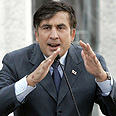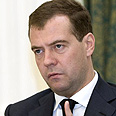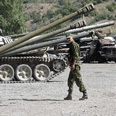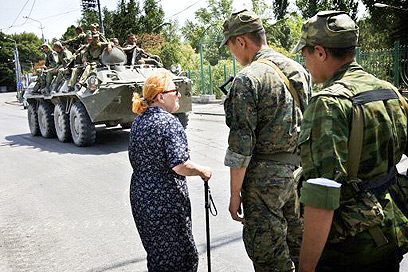


Saakashvili's comments, in a televised address, contrasted sharply with recent descriptions of the Kremlin as "21st century barbarians", looters and thieves and his accusations of ethnic cleansing in the pro-Russian breakaway region of South Ossetia.
The leader of South Ossetia fired his government on Monday and declared a month-long emergency to cope with the aftermath of an armed conflict with the central government.
Eduard Kokoity, South Ossetia's self-styled president, has criticised his cabinet for not doing enough to help thousands of refugees by distributing aid, rebuilding smashed infrastructure and supplying shelter to those displaced by the conflict. "I consider the government was not working effectively so I signed the decree (to sack it)," he told Reuters by telephone.
"We have created an emergency commission to liquidate the consequences of the Georgian aggression. This is connected to the fact that several members of the government are incapable of acting in such a serious military situation."
Russia announced on Sunday it would begin pulling its troops out of Georgia at midday on Monday, under a six-point ceasefire deal brokered by France.
The European Union and the United States, wary of a drift back into conflict if there are delays, are pressing Moscow to finish the pullout quickly.
Kakha Lomaia, the secretary of Georgia's National Security Council, said he saw no sign of a Russian withdrawal.
"The Russian general (Vyacheslav Borisov) promised last night to start the pullout at 10 am, but so far there is no sign," he said on the main highway to Gori, a city in the Georgian heartland that will play a key strategic role in the withdrawal.
Lomaia said he passed 16 Russian checkpoints on the road between the capital Tbilisi and the central Georgian town of Khashuri, west of Gori.
Georgian television showed pictures of Russian forces moving out of the western Georgian town of Senaki, but it was not clear if this was part of the promised larger withdrawal.
Pragmatism
Saakashvili, clearly aware of the enormous animosity towards him in Moscow, said he was appealing not to Russia's mercy but to its "pragmatism and simple common sense".
"I appeal to you that after your armed forces leave Georgian territory, to start serious thinking and discussions about further negotiations, a further search for ways (to conduct) relations in order not to sow discord between our countries for good," Saakashvili said in the broadcast which his press office made available to Reuters in advance.
"Let's not sow discord for future generations."

Russian troops in Gori (Photo: AFP)
The 10-day confrontation around South Ossetia has killed about 200 Georgians, dealt a blow to the Georgian military, damaged the country's economy, disrupted road and rail links and drew Western criticism of Saakashvili's handling of the crisis.
Genocide accusations
Each side has accused the other of attempted genocide. Russia says some 1,600 people were killed in the initial Georgian shelling of the South Ossetian capital of Tskhinvali while Georgia accuses Russian and irregular forces of levelling Georgian villages around Tskhinvali.
The Russians have not set a deadline for its completion but say it depends on stability in Georgia.
The conflict has rattled the West, which draws oil and gas through pipelines across Georgian territory from the Caspian region – a route favored because it bypasses Russia.
US Secretary of State Condoleezza Rice urged Medvedev to withdraw troops quickly.
"This time I hope he means it," she told NBC's "Meet the Press". "The word of the Russian president needs to be upheld by his forces or people are going to begin to wonder if Russia can be trusted."
The conflict began on August 7 when Georgia launched an attempt to retake South Ossetia, which broke with Tbilisi after the 1991 collapse of the Soviet Union. Russia struck back, pouring troops into South Ossetia and then occupying areas beyond the region, in the Georgian heartland.
The six-point peace plan sees their prompt withdrawal from this 'core Georgia', but the West will also be looking for Russian troops to cut back their numbers quickly in South Ossetia itself.
International contacts are under way to decide on a peacekeeping force for South Ossetia itself, though, whatever Georgia's objections, it is likely to contain many Russians.















